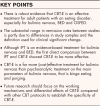Enhanced cognitive behavioural therapy for patients with eating disorders: a systematic review
- PMID: 30188385
- PMCID: PMC6181276
- DOI: 10.1097/YCO.0000000000000452
Enhanced cognitive behavioural therapy for patients with eating disorders: a systematic review
Abstract
Purpose of review: The aim of this study was to provide an update of the most recent (since January 2014) enhanced cognitive behavioural therapy (CBT-E) effectiveness studies (randomized controlled trials and open trials) on bulimia nervosa, binge eating disorder and transdiagnostic samples.
Recent findings: Out of 451 screened studies, seven effectiveness studies (five randomized and two open trials) were included in this review: of these, three had a bulimia nervosa sample and four a transdiagnostic sample (all conducted in an outpatient setting). Substantial differences in posttreatment remission rates were found (range: 22.2-67.6%) due, in part, to differences in samples and operationalization of clinical significant change.
Summary: There is robust evidence that CBT-E is an effective treatment for patients with an eating disorder. However, more studies on differential effects and working mechanisms are required to establish the specificity of CBT-E.
Figures
References
-
- Steinhausen HC. Outcome of eating disorders. Child Adolesc Psychiatr Clin N Am 2009; 18:225–242. - PubMed
-
- Jenkins PE, Hoste RR, Meyer C, Blissett JM. Eating disorders and quality of life: a review of the literature. Clin Psychol Rev 2011; 31:113–121. - PubMed
-
- Erskine HE, Whiteford HA, Pike KM. The global burden of eating disorders. Curr Opin Psychiatry 2016; 29:346–353. - PubMed
-
- Hoek HW. Review of the worldwide epidemiology of eating disorders. Curr Opin Psychiatry 2016; 29:336–339. - PubMed
Publication types
MeSH terms
LinkOut - more resources
Full Text Sources
Other Literature Sources
Medical
Research Materials



